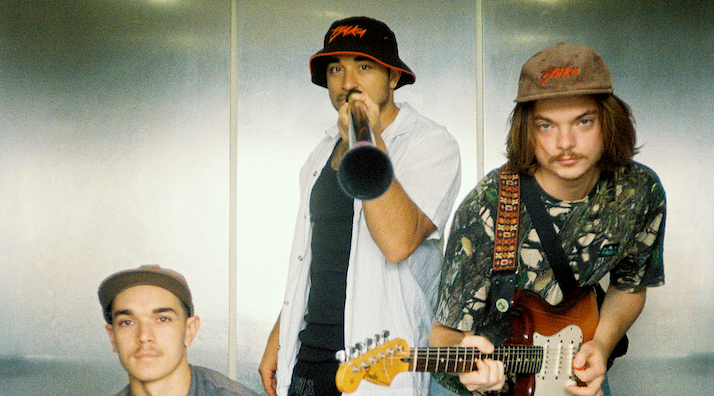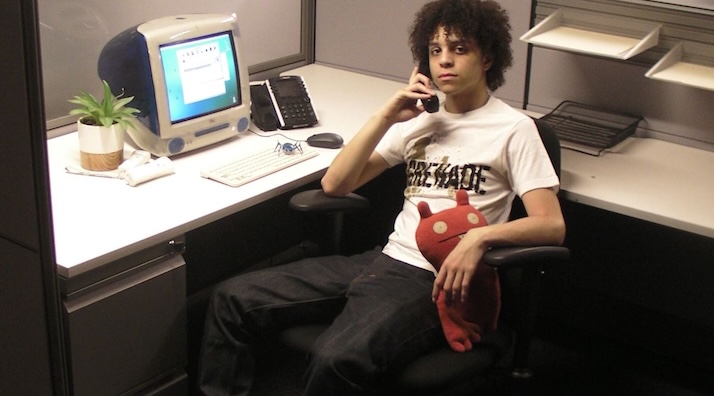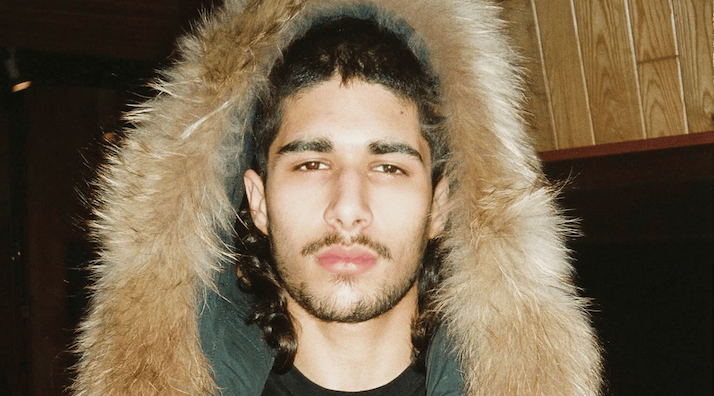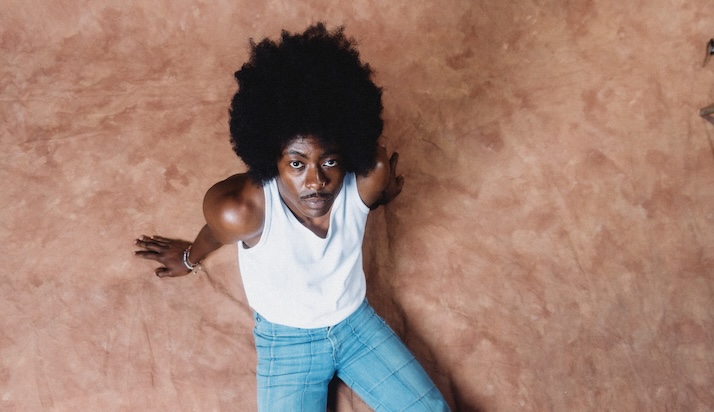Meet Tjaka, the Australian Trio Fusing Hip-Hop and Aboriginal Culture [Q&A]

This Australian trio blew our minds at The Great Escape - one of Europe’s biggest festivals for new music - in Brighton in May. Brothers Geoff and Jake Fabila and close friend Felix Fogarty fuse hip-hop, electronic beats, funk, reggae, and Aboriginal influences - an irresistible concoction that will make you move. The name Tjaka is also a direct reference to Aboriginal culture. It is derived from “Tjakamarra”, the skin name - a sort of surname that indicates an Aboriginal bloodline - given to the Fabilas. Music, especially the didgeridoo, has always been their connection to their ancestors and as Tjaka they mix Indigenous storytelling and sounds with contemporary production, connecting the two worlds in a way that is uniquely theirs.
We caught up with the trio - plus drummer and cousin Luke Fabila - in-between sets in Brighton for a chat about their energetic live shows, honoring their Aboriginal roots and their upcoming debut EP, Elevate.
OnesToWatch: If you had to describe your music to someone who hasn’t heard it, what would you say?
Geoff: Come and see us. It is difficult because there’s no kind of comparison except for the people that came before. What I usually say is hip-hop mixed with electronic music and we play an instrument called a didjeribone which is a modern version of a didgeridoo. So whatever people imagine after we say that is up to them - but the easiest thing is to come and see us.
Luke: We also call it didjtronica.
Geoff: Which for us is pretty vague but that’s good because then we can spread out to different genres. But we’re definitely founded in hip-hop.
I like that - didjtronica. So how did this all start for you guys?
Geoff: Jake and I are brothers, Luke is our cousin. Felix is our brother from another mother - our parents have known each other for forever. So it is almost a family band.
Felix: Jake was the original guitarist in the band.
Jake: There’s one video of me playing guitar and singing. I was terrible.
Felix: I got lucky because Jake did me a favor and broke his collarbone and then he couldn’t play guitar. I got hit up for the fill in gig and now I’m still here.
Geoff: We can’t talk about us without talking about our father. And a man called Charlie McMahon who invented the slide didgeridoo (didjeribone, ed.) and a seismic mic called a Facebass. Charlie was a pioneer for the didgeridoo and moving it in a modern direction and changing the way the instrument was used, inspiring our dad on the way. He is a didgeridoo player known as Tjupurru. He incorporated the use of the didjeribone and Facebass with guitar pedals and has toured and recorded around the world.
The name “‘Tjupurrula” is a skin name given to our dad that originates from the Western Desert kin system. The next name in the system given to the next generation (Geoff, Jake and Luke, ed.) is “Tjakamarra” which is where our band name “Tjaka” comes from. We’re the next evolution of what Charlie and Tjupurru pioneered and like they did, we’re using our influences, experiences and technology to make music. So we can’t tell our story without telling theirs.
That’s super cool. I want to hear more about that but tell me a bit about your songwriting process first. What’s that like?
Jake: This one is hard because it’s different every time. The song “In A Box” is a good example. We were in the studio for half an hour and we made it then and there. We wrote it, made the beat, it was kind of done in half an hour. We didn’t finish the recording but the framework was there. And then we have other songs that took us months.
Geoff: But mostly our songs are pretty collaborative. I might make a beat by myself or have a hook and then I’ll bring it to the boys and we’ll all work on it. Other times Jake has a beat or Felix has an idea. We’re still at the tip of the iceberg and we’re definitely still learning a lot. Not what works best but to see what directions we can go in. We’re pretty open to other ways of doing things.
Luke: We’ve also worked with different engineers for the different singles. But for this coming EP the guys did a lot of the production themselves before sending it off to an engineer.
Yeah, so this EP, Elevate, is coming out on June 20th. It’s your debut! What can you tell me about it?
Geoff: It’s been a lot of work. We wanted to do this EP a couple of years ago but it didn’t work out. This time it happened for a good reason. Jake has really done a lot of it. It has mostly been us three in the studio working it out. I’m sure he has learnt a lot through the journey as well. Even just being the producer side vs. being an artist thinking and talking about different ideas from the backseat. It’s been a really great process - especially being our first ‘project’ or bigger piece of work.
Jake: What I’m probably most proud of is that every one of us has steered the wheel at some point during the process. It’s self-produced and it has touched all of our hands. That’s always been my dream. You hear about going to the studio with famous producers but to be able to do it ourselves, that really means a lot. Not to say that we won’t work with other people and we are still learning a lot but this feels good.
Felix: It’s been really helpful when communicating ideas as well. We’ve been playing together for long enough that if I give a vague description of something like “make it more boomy” then Jake will know exactly what I mean instead of having to find a way to explain that to someone that we might have just met. It’s been really good for the creative flow.
Geoff: Luke’s in the Central Coast (NSW) and we’re in Brisbane (about a 9 hour drive between the two, ed.) but that’s actually also been good for the process. We’d do a lot of work on it and then send it to Luke. He’d have fresh ears on what we’ve been listening to over and over. That’s been really great for feedback. And there’s a guy called Tom Thum, a world famous beat-boxer, who’s produced one of our songs. He’s a pioneer and legend in his field and having him as a friend and sending things back and forth between us has been really great. So we have reached out to people. It’s been good and mostly they are adding to it, not asking us to take things off so it feels like it’s in a good place. We’re excited to finally get it out.
That must be equally exhilarating and terrifying. I want to talk a bit more about your live shows. You said that people should come see you and I very much agree. I’m not a hip-hop person, it’s not normally something I would seek out. But at festivals I try to see as many different things as I can and you guys blew me away. But what is the live show for you? Do you use it in your music?
Geoff: For us, the live show has always come first. We love going to gigs ourselves. The feeling of going to a show, being in the moment. You just remember those experiences and we want to create that environment that we enjoy so much ourselves for other people. And we do that through music we enjoy. We enjoy playing all of the songs, some more than others, but there’s nothing that we don’t want to play.
Do you think about that when you’re making the songs? How they will work live?
Jake: The song itself is always the main priority. But we do think about it as two different things - live set here, recorded stuff there. And sometimes they come together.
Felix: With some songs we’ll see what we can do to make this even cooler live or add a section that makes it more fun for the crowd. There are things we do live in certain songs that aren’t in the recordings.
Geoff: There’s an Australian band called The Cat Empire. They’re one of those bands you can see 20 times and still enjoy it as much the 20th time.
I have never seen them! They’re definitely on my gig bucket list.
Geoff: I’ve seen them so many times. In my opinion they are Australia’s premier live act. The enjoyment you have at their shows is what inspired us and what we want people to walk away with. Regardless of what genre you’re into, how old you are and all that.
Felix: We also just want everyone to feel like they can do whatever they want at a Tjaka show. People want to clap and dance and move and part of performing is that you’ve got to make them feel like they can do that. Be weird and silly.
Jake: Yeah, give them a reason to break loose a bit.
I definitely felt like the crowd was doing that yesterday. And it was just the pick-me-up that I needed. I really loved the didjeribone parts. We’ve already touched upon it but I want to know more about that element and how you incorporate your Aboriginal heritage in your music. You already mentioned that the name Tjaka is a direct reference to it but what else can you tell me? Why is it important?
Geoff: We grew up in Brisbane (on the Australian east coast, ed.) but our Aboriginal side is from the Jabirr Jabirr mob near Broome (Western Australia, ed.). We traced our blood lines to Papua New Guinea and then back to Australia, which is how our family ended up in Brisbane. It’s been a bit of a journey finding out about our Aboriginal side. We knew we were Indigenous but we didn’t know exactly from where until the year 2000. Dad had always had an interest in didgeridoo and that was his connection to his ancestors. We learned to play when we were young. Rugby League is big at home so our dream as kids was to play that professionally but we always had didge there. And now that we’re older and understand that connection and how lucky we are to have that, didge is that link for us. So when we started this project it was always going to be a part of it. It’s a big part of us.
Jake: It’s also important to say that we play contemporary didge - whether that’s using a real didgeridoo or the didjeribone. There are rhythms that the old fullas play in Arnhemland (Northern Territory, ed.) that’s traditional and generational. That’s not what we’ve learned. We play what we know. And respect the ones that know how to play it traditionally - it’s really important.
Geoff: Yeah, and to add on to that: When Charlie McMahon invented the didjeribone, the traditional didgeridoo wasn’t as popular with young people. He was working in Aboriginal communities - he’s a white fella himself with one arm and a hook, he’s really smart and interesting - and his idea was that modernizing the didgeridoo would make it a bit more interesting for young ones and that instead of listening to hip-hop and rap they might be interested in playing didgeridoo. So we’ve almost gone full circle. And if it interests other young black fullas to play it through our music… That was the ultimate goal to start with. I like to think that we are still pushing his legacy along. But yeah, uncle Charlie is the GOAT.
I really love that. So your EP is coming out soon. Then what? What’s happening this year?
Geoff: We’ve got an Australian tour and a few festivals. We’d love to come back to Europe, try out different crowds. And Asia as well. Our first international show was actually in Taiwan which we hadn’t expected. And then when coming to Europe now we had a stop-over in Taiwan - kind of poetic.
Your stepping stone to the rest of the world. Okay, so final question: Who are your OnesToWatch?
Everyone: Rosie and the Quest, DEVAURA, Miles Nautu - there are so many!
Geoff: I’ve been really into South Summit lately. And we’re supporting them on Monday in London. I’ve just been listening to them as a fan and now we’re playing with them. It’s kind of crazy.



